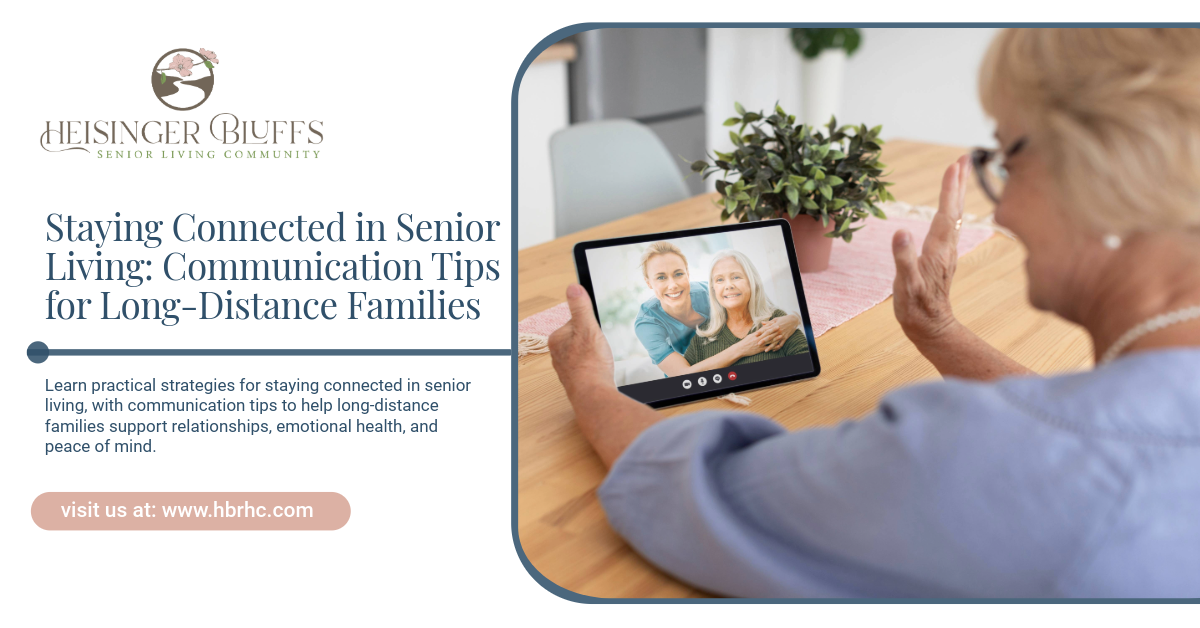How to Ease Guilt When Moving a Parent into Senior Living

Key Highlights:
- Feeling guilt is normal when moving a parent into senior living.
- Open communication helps parents feel respected and included in the decision.
- Gradual planning and familiarization reduce anxiety and guilt for both parties.
- Focusing on the benefits of senior living supports positive emotions.
- Self-care and seeking support are crucial for caregivers’ mental well-being.
Deciding to move a parent into a senior living community is one of the most emotionally challenging decisions a family can face. Many adult children experience guilt, fearing they are abandoning their loved one or not fulfilling their responsibilities.
Understanding and addressing these emotions is essential for a smoother transition and healthier relationships. This guide explores strategies to ease guilt, support your parent emotionally, and embrace the positive aspects of senior living.
Understand That Guilt Is Natural
Guilt is a normal emotional response when caring for aging parents. It often stems from:
- Feeling like you’re “giving up” on caregiving
- Fear of judgment from others or your parent
- Worrying about your parent’s happiness or safety
- Emotional attachment to family traditions
Tip: Acknowledging guilt rather than suppressing it allows you to address the underlying concerns.
Involve Your Parent in the Decision
Open and respectful communication is crucial:
- Discuss options early: Talk about senior living communities before the move is necessary.
- Ask for preferences: Let your parent choose the type of care, room, or activities they want.
- Highlight benefits: Emphasize social opportunities, safety, and healthcare support.
- Address fears: Listen without judgment and validate their feelings.
Tip: Including your parent in decisions helps them feel empowered, reducing resistance and emotional stress.
Plan the Transition Gradually
A slow, thoughtful approach can reduce feelings of guilt and anxiety for both you and your parent:
- Take multiple visits: Tour different communities and encourage your parent to ask questions.
- Short stays first: Consider respite care or trial visits before permanent relocation.
- Pack together: Allow your parent to choose which belongings to bring.
- Maintain routines: Keep familiar daily habits during the transition.
Tip: Gradual steps prevent overwhelming your parent and help you adjust emotionally.
Focus on the Benefits of Senior Living
Shifting perspective from loss to opportunity can ease guilt:
- Enhanced safety and healthcare: 24/7 support ensures peace of mind.
- Social engagement: Group activities and events reduce isolation and depression.
- Personalized care: Staff can attend to your parent’s specific needs and preferences.
- Independence: Structured care allows seniors to retain autonomy in daily life.
Tip: Keep a list of these benefits visible to remind yourself of the positive outcomes.
Stay Connected After the Move
Maintaining strong relationships reduces guilt and supports your parent’s emotional well-being:
- Regular visits: Schedule weekly or daily visits as possible.
- Phone or video calls: Maintain daily contact even if you can’t visit in person.
- Participate in activities: Join community events when appropriate.
- Encourage family involvement: Siblings, grandchildren, and friends can provide support.
Tip: Frequent connection ensures your parent feels loved and reassures you that they are cared for.
Seek Emotional Support
Caregivers often neglect their own emotional health. Support can reduce guilt and improve coping:
- Support groups: Share experiences with others in similar situations.
- Therapy or counseling: Professional guidance can provide perspective and coping strategies.
- Self-reflection: Journaling or meditation can help process emotions.
- Lean on friends and family: Don’t hesitate to ask for advice or help.
Tip: Caring for yourself helps you provide better support to your parent.
Practice Self-Compassion
Recognize that moving a parent into senior living is an act of care, not abandonment:
- Remind yourself of your intentions: Focus on safety, quality of life, and independence for your parent.
- Celebrate the positive changes: Note improvements in social interaction, health, and overall happiness.
- Let go of unrealistic expectations: Accept that guilt is natural but manageable.
- Create positive rituals: Establish meaningful routines like weekly dinners or shared activities.
Maintain Familiarity and Comfort
Ensuring your parent feels at home reduces anxiety and reinforces the benefits of senior living:
- Bring personal items: Photos, favorite blankets, or decorations create a sense of belonging.
- Maintain hobbies: Encourage activities your parent loves.
- Establish daily rituals: Meals, walks, or reading times provide consistency.
- Coordinate with staff: Inform caregivers of routines, preferences, and needs.
Tip: Familiar surroundings and routines help seniors adapt emotionally and physically.
Monitor Emotional Health
Pay attention to changes in mood or behavior during and after the transition:
- Signs of stress: Anxiety, withdrawal, irritability, or sleep changes.
- Seek professional advice: Staff, therapists, or healthcare providers can provide support.
- Encourage open communication: Regularly check in with your parent about feelings.
- Adjust routines as needed: Flexibility helps maintain comfort and happiness.
Strategies to Ease Guilt
| Strategy | Purpose | Example Implementation |
|---|---|---|
| Involve parent in decision-making | Empowers senior, reduces resistance | Tours, room selection, activity choices |
| Gradual transition | Prevents overwhelm and emotional stress | Short stays or trial visits |
| Focus on benefits | Shifts perspective from loss to opportunity | Highlight social, health, and safety gains |
| Maintain connections | Reduces isolation and reinforces care | Calls, visits, family activities |
| Seek support for caregiver | Reduces guilt and promotes emotional balance | Support groups, therapy, self-care routines |
| Preserve familiar routines | Enhances comfort and reduces anxiety | Daily rituals, favorite items, hobbies |
Final Thoughts
Moving a parent into senior living is a deeply emotional decision, but it can also be a positive step for their safety, independence, and quality of life. By acknowledging guilt, involving your parent in decisions, focusing on benefits, and maintaining strong connections, you can ease the emotional transition for both of you.
For families seeking compassionate care and support during this stage of life, Heisinger Bluffs offers specialized assisted living, memory care, and respite care services tailored to individual needs. Contact us today!
Frequently Asked Questions
Is feeling guilty normal when moving a parent into senior living?
Yes. Many adult children feel guilt, but it is natural and can be managed with understanding and planning.
How can I involve my parent without making them feel pressured?
Present options, discuss preferences, and validate feelings. Encourage choice rather than dictate decisions.
How long does it take for parents to adjust?
Adjustment varies but usually takes a few weeks to several months. Gradual transitions and consistent support help speed adaptation.
What if I feel overwhelmed with guilt?
Seek emotional support through counseling, support groups, or self-care practices to manage stress.
How can I ensure my parent is happy in senior living?
Maintain regular communication, preserve routines and hobbies, involve them in activities, and collaborate with care staff.
Sources:











